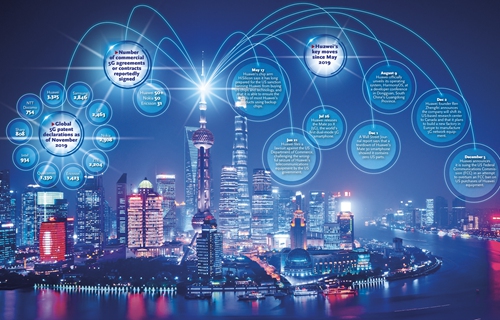HOME >> SOURCE
Huawei ‘de-Americanizing’ its phones
By Xie Jun in Shanghai and Chen Qingqing in Shenzhen Source:Global Times Published: 2019/12/5 23:38:40
US moves lead to lesson: Chinese mobile giant tries to rely on own technologies, new partners

Graphics: GT
Despite being caught in the crosshairs of Washington's assaults on China's technology and trade sectors, Huawei has at least learned one lesson from its treatment by the US. That is: cross-border business partnership is something worth seeking but never to be taken for granted.
This lesson was reflected in a comment by Huawei's chief legal officer Song Liuping on Thursday, when he expressed an ambivalent attitude to the US during an interview with the Global Times.
"If permitted by law, we will maintain collaboration with the US. If the US adopts administrative measures to exclude Huawei from research and investment locally, we will have no alternative but to move to other locations to carry out those missions...Of course, we hope to maintain our global supply chain," he said.
His comments delivered the message that Huawei is confident of shaking off dependence on US supplies if it has to, something that the Chinese mobile phone giant was already doing but is now doing faster because of the trade friction.
Recently, a Japanese technology company analyzed the Huawei Mate 30's hardware and found it doesn't contain a single item originating from the US, the Wall Street Journal reported on Sunday.
The device was found to contain NXP Semiconductors from the Netherlands in place of semiconductors from US-based Cirrus Logic. The phone uses the Kirin 990 chip, built by Huawei itself.
The findings, if accurate, show that Huawei's faster steps to completely replace US-made parts in its phones are paying off, experts said.
De-Americanization wouldn't be a problem for the master chips in Huawei phones, as Huawei has taken steps since 2018 to replace Qualcomm chips with propriety chips in its flagship mobile sets like the Mate, Sun Yanbiao, head of Shenzhen-based research firm N1mobile, told the Global Times.
But it's not easy for the supplementary chips to be replaced, as most Chinese mobile phone makers, including Huawei, have customarily imported more than half of their 200-some minor mobile chips from the US, said Sun.
Apart from mobile parts, Huawei is de-Americanizing all of its products. The company told the Global Times in September that US suppliers provided about one-seventh of Huawei's components. Based on information the Global Times obtained, Huawei is now buying less from the US.
"It's highly possible that Huawei might be forced to fully abandon US elements, but it will be achieved at a cost - a sacrifice in some of its functions -- and it's a time-consuming task that could not be achieved overnight," Jiang Junmu, chief writer at telecom industry news website c114.com.cn, told the Global Times on Thursday.
However, he said that Huawei has the ability to go on strongly without US suppliers as European and Japanese suppliers fully have the ability to replace their US counterparts.
Pressed by trade war
Huawei's efforts to reduce dependence on US parts come as the Trump administration leads an all-out effort to keep Huawei out of wireless networks in the US and globally. In May, the US government added Huawei to an "Entity List," banning US companies from selling parts to it unless they obtained special permission.
According to Sun, Huawei realized the importance of reducing its dependence on US supplies before the trade war, but it was the trade war that pushed the company to carry out its backup strategy in a comprehensive manner.
A Huawei employee also said that Huawei had hastened steps to launch products around May, when many of its units were added to the US Entity List.
"In May, we started working extra hours and stocking up ahead of time to prevent shortages of supplies. We also sped up research and development and production to launch products as soon as possible," the employee told the Global Times on condition of anonymity on Thursday.
But the work pace went back to normal in July, he disclosed.
Sun also said that Huawei's launch of its proprietary HarmonyOS operating system was accelerated by the trade friction.
"The trade war gave HarmonyOS a good chance to be developed, not only because Huawei was pressed to find backup products for the Google-developed Android, but also because demand for HarmonyOS will surge in China out of patriotic feelings," he said.
But trade war was not the only reason for such "de-Americanization" efforts. As Huawei develops master chips with a better quality than those the US produces, there's no reason for Huawei not to use its own products, experts said.
"I believe the trade war will deepen Huawei's conviction that it must be capable of independence technically, even though its business with US companies might increase if political winds change," Sun said.
Shen Weiduo contributed to this story
Posted in: INDUSTRIES,ECONOMY,BIZ FOCUS